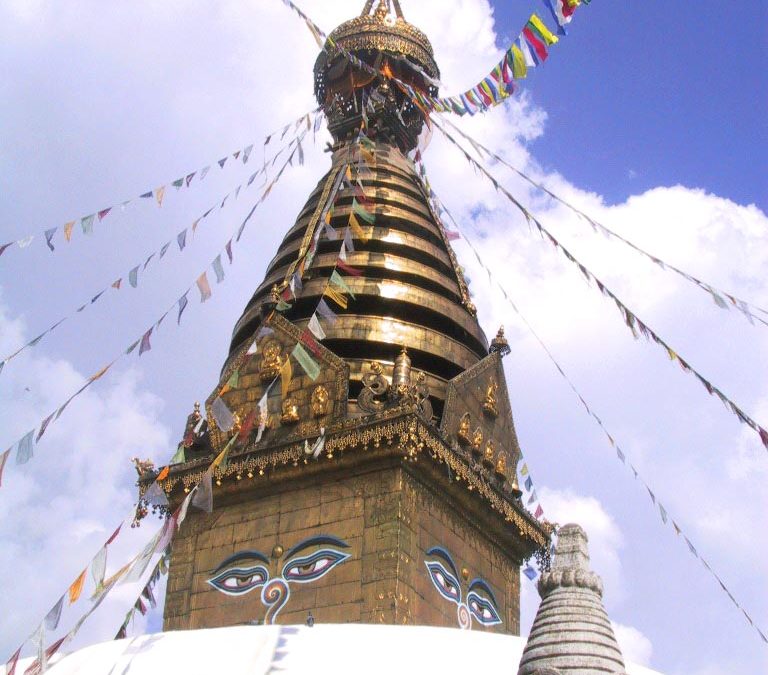Day 15 of 17, trekking on the Khumbu trail up to and back down from Everest Base Camp
Apparently, the Nepali people have never been tickled, or not tickled properly. My trekking partner and I have made ourselves unofficial Tickle Ambassadors to the local people, spreading the joy as far as we can. We had started early on by tickling our guide, Gita, after getting to know him adequately, of course. Then we tickled the young daughter of the owner of the lodge where we spent two nights our first time here in Namche Bazaar, a small village at 11,300 feet. I’m not saying that we tickle strangers, but there are a few people in this village who go into a defensive tuck when they see us coming.
Last night, I’m not sure how it started – I think Gita did something that merited a good tickling, so my partnet and I went at him from both sides. Gita laughed hard and squirmed like a monkey, so that’s now his nickname. The small crowd who had gathered around the stove for warmth laughed hard too. The crowd was just the lodge manager, the waiter, the cook, a younger brother and two sisters, and a Tibetan carpet salesman. The lodge manager then told us, in limited English, that he was not ticklish. The Tibetan attacked him from behind, testing that non-ticklish claim. After what seemed way too long, even as a bystander, the Tibetan gave up. It was clear that the manager was not ticklish, and did not enjoy the test. But then someone asked the manager about the tickle status of his feet. You should have heard him laugh at just the thought of having his feet tickled! When I pretended to go after his feet with just one tickle finger, he roared with laughter. We never tickled him but we did ask where he would be sleeping and told him to go to bed barefooted.
It’s Saturday here, not that days of the week matter to us anymore but here in Namche Bazaar, Saturday mornings mean a big market, swap-meet style. They sell everything that you would never want – including goat carcasses with hooves, for which we were trying to imagine recipes. Last night, at our lodge in Khumjumb, just farther up the hill, a Tibetan carpet salesman stopped in to spend the night on his way to this morning market. As is typical of the Tibetans who we’ve run across, he smelled fiercely horrible and the lodge manager “invited” him to sleep outside near the campers’ kitchen tent. We are now fairly accustomed to smelly badly ourselves and our new insult is that “you smell like a Tibetan”. It takes many long days of sweating into the same clothes to work up a Tibetan-grade funk. We hike very hard, every day, for hours. Sometimes it seems that our entire hike is uphill, but that will happen when you’re near the highest mountains in the world. Our showers are infrequent luxuries as not every lodge offers them, those that do charge a lot extra, and it is often too cold to convince us to disrobe. We rarely wear fewer than three or four layers. Even my partner, who is warm in all but the coldest conditions, has been wearing gloves indoors.
Before coming to Nepal, we had both imagined that all Tibetans were like the Dali Lama – clean shaven, well behaved, benevolent, quiet, maybe shy or unassuming. But the Tibetans that we have met on the mountain trails have been dirty, extremely rough looking, and very aggressive in trying to sell the simple bead necklaces that every single one of them wear. Why anybody would pay for a few colored beads on a piece of black string that has just come off one of these sweaty, stinky guys is way beyond my jewelry dreams.
We spent last night in what we now consider a luxury resort as it had both electricity and an indoor toilet! And, the toilet was the Western-style stool type that you picture when you say “toilet” in the U.S. We purposely tried to drink a lot of liquids just so we could get our fair use of it. Most of the other lodges that we’ve been calling home recently have had only outhouses, and experience has given me a crash course in using them. I have learned to how properly prepare my pockets with the necessary amount of toilet paper, take off my gloves before entering the outhouse, and to put them back on only after I get safely outside. No matter how the cold temperature, it’s too risky to try to put on gloves where they might fall to the wet surface of the outhouse floor, or worse, into the hole. Plus, I have learned to check out the location of the hole in the outhouse floor before walking in too far. I’ve learned a lot of things that I hope will not be useful in the very near future, or ever again.
I have been somewhat crabby and depressed for the past few days as I have been almost constantly cold and tired and almost never alone. More than 80% of Nepal is without electricity. I read that statistic before coming here but I just figured it meant that hotels would not have cable TV. I did not think it through far enough to realize that no building would have lighting or heat, even at these really high altitudes where it always feels like winter. All the trekkers have a cough and/or sniffly nose, due to the cold temperatures, altitude sickness, and the polluted air. You would think that mountain air in the Everest region would be some of the purest on earth. But without electricity, the only controllable source of heat is from fire. Above the tree and vegetation line, the fires are fueled with 10% wood and 90% dried yak dung, which is in obvious abundance. Each lodge uses an indoor “wood” stove to provide a few hours of heat each evening but only to the common area, and all the guests, porters, guides and hang-abouts congregate there to eat, talk, rest, and share the limited warmth. However, the stoves put out quite a bit of smoke. Yak dung smoke burns your eyes and contributes to a hacking cough, locally known as the “Khumbu cough”. The common areas were dirty, dank, dark, and foul smelling, and I swear the yak dung smoke left a film on my teeth. Ever the optimist, Guy remarked that because the Nepalis collect and use the yak dung, the trails are kept fairly clear of it.
The “lodges” where trekkers sleep and eat are wooden shanties, romantically called “tea houses”. And the sleeping areas are really just wind shelters made of small sheets of quarter-inch plywood cobbled together to resemble room shapes. Some “rooms” would house an old cot and/or a thin, foam mattress. We found ourselves excited if our room came furnished with a waste basket.
As I said, there was no electricity or lighting but there were usually enough holes in the walls or gaps between floor and ceiling to let us see if a stray dog had wandered into our room when one of us walked outside to go to the outhouse. There was no privacy given by these paper thin walls and sometimes it was difficult to tell whether the noises were coming from inside or outside our own room. High altitudes give people a range of health problems: nausea, coughs, sleeplessness, farting, burping, restlessness, etc., so the lodges have the sounds of low-income infirmaries and we were all aware of each other’s ailments. There were so many ever-present and foul malodors that you could easily fart wherever, whenever you wanted and get away with it.
We are now 10 days away from the nearest road. Distances here are measured in time, not physical dimensions, partly because there are various routes and trails to every place, and partly because the only way to get anywhere is on foot.
You ask, “How far is Lobuche from Portse?
Answer: “Two days.”
Four or five days ago, while up in Gorak Shep – the highest altitude village in Nepal at 17,000 feet – we were 14 days from the nearest road. Everything that is in Gorak Shep, and even any village higher than Lukla (11,000 feet), had to be carried in by person or by yak. That’s why in Gorak Shep a can of Coca-Cola costs more than $3, while our double room cost only $1.25, and was almost worth it. That should be fair warning: if a can of soda costs more than your “hotel” room, something is out of whack.
There are a very different set of priorities here than what we are used to in the U.S. No one dresses for fashion here, just for function – and function means warmth and work. Everybody, and I mean everybody, is filthy. It is expensive to get clean and impossible to stay clean. I hadn’t seen a mirror or even my reflection for 15 days and I was living in blissful ignorance. I told Guy that I want to dress as a Tibetan for Halloween. He said that I have a very good start on the stinky-stank. But I was not offended; I’m just trying my best to fit in.
I’m off now to pick up our laundry and slip into clean clothes for the first time in 12 days.
Tomorrow, I may shower. Life is good.


Recent Comments